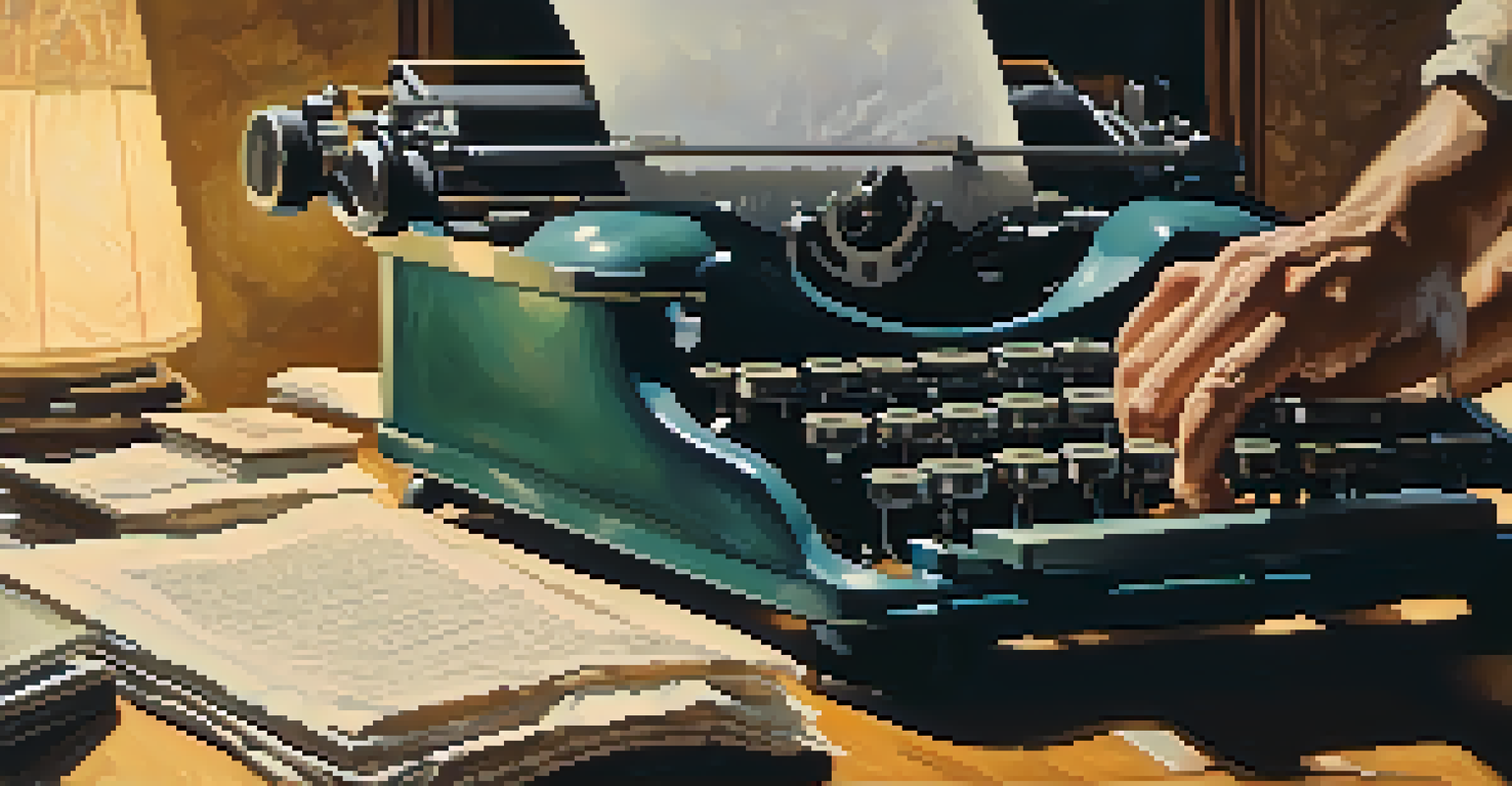Overcoming Writer's Block: Strategies from Workshops

Understanding Writer's Block: What It Is and Why It Happens
Writer's block can feel like an insurmountable wall that stops creativity in its tracks. It often arises from a mix of stress, perfectionism, and fear of failure, making it a common experience for writers. Imagine trying to run a marathon but suddenly hitting a wall; that's how it can feel when inspiration just doesn't flow.
You can’t use up creativity. The more you use, the more you have.
Recognizing the signs of writer's block is the first step toward overcoming it. This could be feelings of frustration, self-doubt, or even procrastination. Acknowledging these feelings allows you to address them head-on instead of letting them fester.
Understanding the nature of writer's block is crucial—it's not a reflection of your talent but rather a temporary state. By shifting your mindset and viewing it as a challenge to overcome, you can begin to explore strategies that will help you move forward.
Creating a Supportive Writing Environment
Your writing space plays a significant role in your creativity. A cluttered or distracting environment can hinder your ability to concentrate, while a clean, organized space fosters inspiration. Think of your writing area as your creative sanctuary; it should reflect your style and make you feel comfortable.

Incorporating elements that inspire you, such as artwork, plants, or even your favorite music, can help create a more inviting atmosphere. For example, listening to calming instrumental music can help drown out distractions and keep your mind focused on your words.
Overcoming Writer's Block
Writer's block is a temporary state influenced by stress and perfectionism, and recognizing it is the first step toward overcoming it.
Additionally, setting boundaries around your writing time can help create a sense of commitment. Letting others know when you’re not to be disturbed can give you the uninterrupted time you need to dive deep into your thoughts.
Setting Realistic Goals to Encourage Progress
One common pitfall for writers is setting overly ambitious goals, which can lead to disappointment. Instead, break your larger writing projects into smaller, manageable tasks. For instance, if you're working on a novel, aim to write just one page a day rather than overwhelming yourself with the entire chapter.
The worst enemy to creativity is self-doubt.
This strategy allows you to celebrate small victories, which can boost your confidence and motivation. Each completed task serves as a reminder that you are making progress, no matter how small. Think of it as building a brick wall—each brick adds up to create something substantial.
Moreover, setting time limits for these tasks can increase your focus. Using techniques like the Pomodoro Technique, where you write for a set period followed by a short break, can help maintain your momentum without the pressure of an endless writing session.
Experimenting with Freewriting Techniques
Freewriting is a powerful technique that encourages writers to jot down their thoughts without worrying about grammar or structure. It’s like setting your mind free on the page and can help shake loose the cobwebs of writer's block. Just set a timer for 10-15 minutes and write whatever comes to mind.
This method not only helps you bypass the inner critic but also can lead to unexpected ideas and insights. The key is to keep your pen moving or your fingers typing, allowing your subconscious to surface thoughts that might not have emerged otherwise.
Creating a Nurturing Space
A well-organized and inspiring writing environment can significantly enhance creativity and concentration.
Once the time is up, you can sift through what you've written for ideas or phrases that resonate with you. This process can act as a warm-up, clearing your mind and making way for more structured writing afterward.
Engaging in Brainstorming Sessions
Brainstorming can be a fun and effective way to generate ideas when you're feeling stuck. Gather a few fellow writers or friends and discuss your project; sometimes, just talking it out can spark new thoughts. Picture it like a potluck dinner—everyone brings something unique to the table, creating a feast of ideas.
You can also try mind mapping, where you write down a central theme and branch out ideas associated with it. This visual representation can help you see connections you might have missed and can stimulate your creativity.
Don’t shy away from wild ideas during brainstorming! Often, the most unconventional thoughts can lead to innovative solutions. Embrace the chaos; it's all part of the creative process.
Taking Breaks: The Power of Stepping Away
It may seem counterintuitive, but taking breaks can actually enhance your writing productivity. When you feel stuck, stepping away from your work can provide clarity and a fresh perspective. Think of it like letting a pot of soup simmer; sometimes, giving it time allows the flavors to meld beautifully.
Engaging in a different activity—whether it’s taking a walk, reading a book, or practicing a hobby—can recharge your brain and help you return to your writing with renewed energy. Even a short break can help reset your mind and reduce feelings of frustration.
Embracing Imperfection
Accepting that first drafts don't have to be perfect can liberate your writing process and encourage creativity.
Moreover, allowing yourself to rest can prevent burnout. Remember, creativity doesn’t thrive under pressure; it flourishes in a relaxed and open environment. Prioritizing self-care is a crucial aspect of sustaining your writing practice.
Seeking Feedback to Gain New Perspectives
Sometimes, sharing your work with others can break the cycle of writer's block. Feedback from trusted peers or writing groups can provide fresh insights and constructive criticism. Think of it like getting a second opinion at a restaurant; you might discover a dish you never considered trying.
Engaging with others also reminds you that writing is a shared experience. It can be comforting to know that fellow writers face similar challenges, and discussing these hurdles can foster camaraderie and support.

When receiving feedback, approach it with an open mind. Not all suggestions will resonate, but some may provide the spark you need to rekindle your creativity. Remember, writing is a journey, and collaboration can enhance that journey.
Embracing Imperfection on the Writing Journey
One of the biggest obstacles writers face is the fear of not being perfect. Embracing imperfection can liberate your writing process and allow your true voice to shine through. Rather than striving for flawless prose in your first draft, focus on getting your ideas down on the page.
Consider the analogy of sculpting; the first step is to shape the clay without worrying about the fine details. Only after the initial form is created can you begin to refine and polish. This mindset shift can alleviate pressure and encourage creativity.
Remember, every great piece of writing goes through revisions. Allow yourself the freedom to write poorly at first, knowing that you can always edit later. It’s all part of the artistic process, and embracing this can help you move past writer's block.